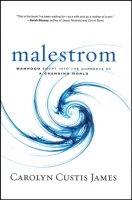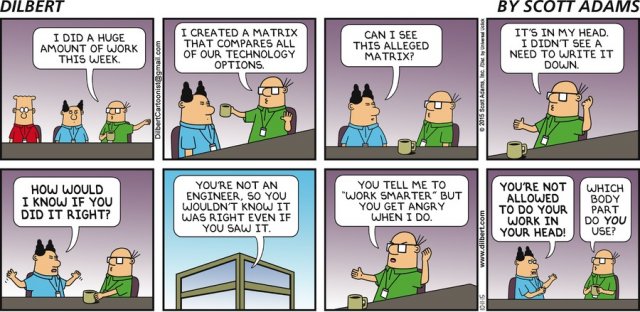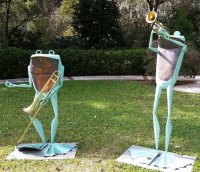 Food Foolish: The Hidden Connection Between Food Waste, Hunger and Climate Change by John M. Mandyck and Eric B. Schultz (Carrier Corporation, 2015)
Food Foolish: The Hidden Connection Between Food Waste, Hunger and Climate Change by John M. Mandyck and Eric B. Schultz (Carrier Corporation, 2015)
Have you ever heard of a cold chain? Me, neither. Yet we have depended on cold chains all our lives. If you don't drink your milk as it comes from the cow, then your life depends its being kept cold, whether it goes straight from the cow to your refrigerator, or travels thousands of miles in a refrigerated truck before being placed in the refrigerated dairy section of your grocery store. That vaccine your child just received? Useless, if it hasn't been kept sufficiently cool on its way from the manufacturer. Unless they're kept cool, fruits and vegetables start rotting the moment they're picked, losing flavor and nutrition, eventually becoming unusable.
The cold chain explains why the Carrier Corporation published Food Foolish. Keeping things cool is their business, and they've made it their business to develop sustainable technologies to do so. Along the way, they discovered a shocking truth: At least a third of all the food we produce in a year is never eaten.
The impact of food waste on hunger, climate change, natural resources and food security is enormous. It's changing the way we think about our product and technology development. It's strengthening our commitment to sustainable innovation. It's also prompting us to convene research and food chain experts to find solutions. We believe that food waste is an issue that must be elevated and examined globally. That's why we published Food Foolish. It's not an attempt to be the final word on the topic of food waste. Rather, it's meant to connect the issues of hunger, resource conservation and climate mitigation. We hope it will be a catalyst for more meaningful global dialogue which, many think, is essential to the sustainability of the planet.
That's why Carrier published the book. What do the authors say about why they wrote it?
Hunger, food security, climate emissions and water shortages are anything but foolish topics. The way we systematically waste food in the face of these challenges, however, is one of humankind's unintended but most foolish practices. We wrote this book to call attention to the extraordinary social and environmental opportunities created by wasting less food. We are optimistic that real solutions to feeding the world and preserving its resources can be unlocked in the context of mitigating climate change.
Food Foolish is a small book (182 pages) but very powerful. We're reasonably conservationist-minded around here, having been brought up that way. I feel pretty good that we put very little trash out on solid-waste pickup day, and the reason there's not usually much in our recycling bins is that we consume far less soda and beer than average. We take short showers and are in other ways mindful of our water use. Except for animal products, almost all of our food waste goes to feed our composting worms.
Ah. Our food waste. That broccoli that got shoved to the back of the refrigerator and forgotten? It fed the worms, so it's all good. Or maybe not....
When we consider ways to protect our fragile water resources, we need to look first and foremost at the global food supply chain. California provides one good example. The state produces nearly half of all U.S. fruits, vegetables and nuts from the very areas hardest hit by drought. Monterey County alone produces about half of the country's lettuce and broccoli.
Now imagine a consumer rummaging around in the back of his refrigerator's vegetable drawer only to find a forgotten head of broccoli, now yellow and unappetizing. He drops it in the trash. No big deal, right?
But wait: Fresh broccoli is about 91 percent water, and that's just the start. It actually takes a farmer about 5.4 gallons of water to grow that single head of broccoli. Just as each food product has an embedded carbon footprint, it also has a quantity of embedded freshwater from its journey along the food supply chain. In fact, a single person blessed with a healthy, nutritious diet will drink up to a gallon of water per day but "eat" up to 1,300 gallons of embedded freshwater in his food.
This little book stuck a sharp pin in my pride. Sure, it's better that the worms ate our spoiled broccoli than if it had gone into the landfill. But it was still a terrible waste. There's a lot more cost to producing food than what we see at the cash register. Water, fertilizer, pesticides, depletion of the soil, labor, storage, transportation—the human and environmental costs of that head of broccoli make it far too costly to become mere worm food.
Food waste also has a devastating impact on the environment. The water used to grow just the food we discard is greater than the water used by any single nation in the world.
[I]f food waste were a country by itself, it would be the third largest emitter of greenhouse gases behind China and the United states. Yet the connection between food waste and climate change is missing from policy discussions and public discourse.
Throughout history, human ingenuity has consistently foiled those who prophecy imminent doom in the form of mass starvation. Thomas Malthus (in 1798) and Paul Ehrlich (in 1968) both assured us that population growth inevitably leads to massive famine. Ehrlich specifically predicted that no matter what we tried to do about it, hundreds of millions of people were going to starve to death in the 1970's.
Fortunately, both Malthus and Ehrlich were wrong. Since The Population Bomb was published in 1968, the world's population has doubled to over 7 billion people. Despite this increase, humankind has managed to grow its food supply faster than its population. Eighty percent of the victims of famine in the last century died before 1965. Since the mid-20th century, famine has been more a function of civil disruption than of limited food supply.
The Green Revolution spiked Ehrlich's misanthropic guns, but the concern is back, and with reason. Dependent as it is on oil-based fertilizer, irrigation, and monoculture crop farming, the Green Revolution in its original form is not sustainable. A different kind of agricultural revolution is needed.
The political will exists to improve upon the gains of the Green Revolution, bu the landscape has changed. While the focus remains on alleviating chronic hunger, there has emerged a fundamental understanding that simply expanding farmland and improving crop yields are insufficient to feed a growing planet. Any new solution must be sustainable. ... Observers agree that if humankind wants to engineer a new "miracle" to help feed our growing planet, it must be fundamentally different in shape and substance from the Green Revolution of the 20th century.
Enter food waste awareness. By the numbers, if we could eliminate food loss altogether, we could increase our food supply by 50 percent! In the real world, complications must enter the equation; even so, reduction of food loss and waste is an area of tremendous potential for feeding the world while healing the environment.
Food Foolish covers a lot of ground, and if you like concrete information densely but attractively presented, you'll be happy. (If you're fond of Oxford commas, you will be less pleased, but their lack is not as obvious when reading as it was to me when typing up the quotations below—and having to backspace again and again to remove the comma that my fingers automatically insert when typing lists.) Yet the authors cannot cover everything, which I remind myself when I consider issues of corruption, abuse of power, and even bloated bureaucracy that keep food from reaching the hungry. As the International Justice Mission has noted, we can provide people with food, skills, books, schools, medical supplies, tools, seeds, and even land, but without honest and functional political and legal systems, they won't be able to hang onto them. Clearly the problems of hunger, resources, and the environment must be tackled on many fronts.
Fixing the global food supply chain requires investment. ... Sometimes the humanitarian return of "doing good" is enough; certainly governments spend simply for the good of their citizens. Other times a true financial return is required to persuade people to act, especially in the private sector. The moment those two returns intersect is a moment of critical mass, when doing good and doing well align, rapidly accelerating innovation and new investment.
There is precedent for this kind of global alignment. In 1993 the U.S. Green Building Council was formed to promote sustainability in building design, construction and operation. At the time, green investment seemed expensive and was misunderstood. "Prior to the U.S. Green Building Council," remembers Rick Fedrizzi, CEO and founding chairman, "Environmental organizations and business lined up against one another. What we did at USGBC was to create a place where business could actually engage one-on-one with environmental and government organizations. By having a voice and a pace at the table, some of the best ideas imaginable have come forward."
...
The global green building movement began as a way to protect the planet and "do the right thing." Today it has become a business imperative that drives real financial return, including significant improvements in tenant occupancy and retention with higher rents and overall building value.
One of the strengths of Food Foolish is its emphasis on positive actions more than blame, and its revelations of the global nature of both the problem and the solutions: everyone has a part to play. Half of all global food loss occurs in Asia, and there's much that can be gained from solving the problem there. But ...
What does food loss look like per person? On a per capita basis, Europe, North America, Oceania and Industrialized Asia waste between 300 and 340 kg of food per year. South and Southeast Asia, despite high absolute waste, have among the smallest per capita at 160 kg. In addition, in medium- and high-income regions, most waste occurs at the end of the supply chain when food is discarded by consumers and retailers. This means that energy inputs such as harvesting, transportation and packaging are embodied in the food. For example, if we must waste a tomato, it's relatively better to have it decompose in the field rather than pick, clean, pack, cook, ship and display it at retail, only to have it thrown out by a consumer.
There are two very different kinds of problems associated with food loss and waste. One is structural in nature: bad weather, poor roads, improper packaging and an inadequately refrigerated distribution system. Many of these issues can be addressed through careful planning, poliitcal will and sufficient investment. And then there are problems taht are economic and cultural in nature, powerful forces almost built into the system. Food too expensive to be purchased will rot in the warehouse. Food too unprofitable to harvest will be lost in the field. Meal servings that are twice what a person can eat will be partially discarded. A perfectly edible apple with harmless spots or a misshapen carrot might be tossed in a landfill if there are cheap and perfect alternatives. The elements of supply and demand, pricing, tradition and culture all play an important role in food loss and waste. Most of all, ... [it is] clear that there are challenges and opportunities enough for the entire global community.
Developing nations can have the greatest impact on food loss, hunger, land use, climate change, and ... freshwater by focusing on upstream improvements—harvest and distribution—in the food supply chain. Developed countries need to emphasize reductions in downstream food waste.
And now for the random quote section you all look forward to. I warn you that it's just a taste of the book and I've left a lot of important stuff out. (More)
Today's Beetle Bailey is for all our Swiss folks:
Permalink | Read 1998 times | Comments (1)
Category Just for Fun: [first] [previous] [next] [newest]
Long ago, my friends who are university professors shared their frustration that their students were coming to college woefully under-performing in mathematics—even the math majors. How could they teach the college-level math they were charged to impart to their students, when those students hadn't even grasped the math they were supposed to have learned in high school, or even earlier?
This article shows that non-technical fields have similar problems. (H/T BJT)
When Michael Laser attempted to teach expository writing on the university level, he ran into a major glitch: his students couldn't construct basic, readable sentences.
The teaching of writing has become an academic specialty with its own dominant philosophy, which argues against grammar instruction. But I believe that ignoring awkward writing will prove to be a mistake — an educational fashion that will handicap a generation, until someone shouts, Look at the clumsy writing our students are producing! I’m not saying the current focus on constructing competent arguments is wrong. But many students arrive at college unable to write grammatically correct sentences, and we need to teach them that skill, too.
I commend Laser for his attempts to fill in the huge gaps in his students' educations, but the most important sentence of his essay is this one: Their writing may improve with practice as they make their way through college — but they’ve already been practicing for twelve years!
Bingo. School has swallowed thirteen or more years of these adult children's lives, and disgorged them incompetent in the very basics of reading, writing, and arithmetic. Colleges are wasting very expensive class time attempting to make up the deficit, but according to Laser, success is elusive. Have we managed to inoculate our children against learning? Have they developed a resistance to education over the years, like antibiotic-resistant bacteria?
I can't believe that so many American children have suddenly become stupid; I have to believe that the system is failing them. Yet even if large numbers of children have started to come into the system without basic competencies—and don't forget, the system gets them younger and younger these days, so they haven't had much time to fall—isn't the end result ample evidence that the system has broken down and needs to be changed? If they can't learn to add, why don't we give them calculators and train them to be plumbers, a profession that is necessary, can't be sent overseas, and almost certainly will earn them more money than they're likely to get upon graduating from college still incompetent in basic academics and with a mountain of debt besides?
And yet, attempts to require accountability from our schools are met with extreme resistance, not only from administrators and teachers and unions, but even from parents. The last astonishes me. What I wouldn't have given for a system that provided a clear measure of what my children knew going into a school year and what they knew coming out, coupled with the ability to make educational choices based on that information! In all the kerfuffle over so-called high-stakes testing these days, I see with sorrow that administrators don't have sufficient faith in their teachers, and teachers don't have sufficient faith in themselves, to keep teaching as they've always taught. Tactics such as teaching to the test, repetitive testing, and making a big deal out of the whole thing don't educate children—they only invalidate the results. This is the equivalent of the college-student trick of pulling an all-nighter the day before an exam, and we all know how much education that engenders.
I'm not denying that there is gold that can be mined from the school system, but there is so much dross, and even the brightest kids are losing, especially when you consider their potential. Laser writes,
A few bright students will quickly absorb the new concepts; the others will fill out their worksheets on subject-verb agreement almost perfectly, and then write things like, The conflict between Sammy and Lengel are mainly about teenage rebellion.
Note that the students he calls bright, the ones who picked up on what he taught them, found those basic skills to be new concepts.
Again, let me be clear: I know there are great teachers—our children experienced several of them—and good schools. I know teaching is a very difficult job, one I could not do. (I'm a good tutor with students who want to learn. Give me a whole classroom, however, or a student who doesn't care, and I'd run away, screaming.) But look around: How can a system with such a terrible time-and-effort to effectiveness ratio not be broken? We have taken away the best hours of our children's childhoods, and given them what in return? Proms? Football games? The chance to sit in the same room as their age-mates for hours on end? A few crumbs of learning that should have been acquired in a fraction of the time?
Which of you, if your son asks for bread, will give him a stone?
Today's Dilbert is for all the bright students frustrated by teachers who insist that they show their work.
Don't overthink it; I just think the last panel is funny.
I know it's sometimes important to show the intermediate steps, and what I used to tell my students was that they didn't need to show their work, but that if they didn't, they wouldn't get any partial credit if their answer didn't agree with mine. Too many teachers, however, don't understand that some students can no more explain the process by which they arrive at the correct answer to a math problem than a fluent reader can detail the steps by which he understands a paragraph. "Showing your work" becomes a matter of reverse engineering, which is another skill altogether.
I've noticed a strange error in the time stamp when I take videos with my phone. A Google search has not led me to others experiencing the same problem, so I'm posting it here so that the problem will be "out there" in case someone comes along.
The photo and video time stamps seem to be consistent and accurate, until I change time zones. When I do, my phone automatically updates its time to reflect local time, which is exactly what I want it to do. Whatever time stamps my photos apparently grabs the system time, because they show the correct local time. However, the videos do not.
When I shot videos in St. Louis, Missouri, which is on Central Time, their time stamp was still on Eastern Time—one hour ahead. When I took videos in Switzerland, the time stamp acted as if I were still back in the U.S., on Eastern Time: it was six hours behind.
As long as I am aware of the problem, I can easily correct the time because my file naming convention includes the date and time. I just have to remember to add or subtract for the videos, and that's usually easy enough because otherwise they appear out of sequence. That's how the problem came to my attention in the first place.
But what I'm really curious about is why the photos have the correct time and the videos don't. It's the same camera that takes them both. The only logical place for the software to get the time is from the phone's system time. But obviously whatever stamps the videos is doing something altogether different. Well, not altogether: the minutes and seconds are correct. It's just the hour that's wrong, and it's clearly a time zone effect.
If anyone comes by here looking for answers, I don't have them. But at least you'll know that someone else has had the problem. And if anyone comes by with solutions, thanks in advance!
Would you be this cool if you found an eight-foot king cobra under your dryer?
Mike Kennedy's cobra escaped a month ago. Intense efforts on the part of many to find it came up empty.
Last night Cynthia Mullvain was putting clothes in her dryer when she heard a hiss.
Did she panic? Throw a fit? No, but she did call for wildlife officials to come investigate.
They retrieved the missing cobra, which was officially identified by its microchip—not that king cobras are so routinely found in Ocoee, Florida that there was any doubt.
Ms. Mullvain is not suing—someone, anyone, everyone—for pain and distress. She didn't whine to the media about how scared she was, and how no one should have to go through such an experience. She didn't demand that the cobra be killed or not returned to Mr. Kennedy. She's happy to have him go back home, as long as his enclosure is secured.
I think Cynthia Mullvain is one cool lady and reacted just the way a good citizen should have.
Permalink | Read 2186 times | Comments (0)
Category Random Musings: [first] [previous] [next] [newest]
This summer I noticed that our grandson was reading a book about "staycations." I think it was about how to have a great vacation but save money by staying in your own town, and your own home, but acting as if you were on vacation: eating out, seeing the attractions that you would see if you were visiting your city as a tourist, etc. However, my mind leapt at a different interpretation of the term: What if I "went on vacation" but never left home?
To me, vacations are not only fun but critically important, being mostly about family, but they are anything but relaxing. I leave behind one set of responsibilities, but take on another, and if grandchildren are a joy that reminds me life is worth living, they don't leave much time for rest. Or for making any progress on my own work, which is always waiting for me when I return. So when Porter planned a three-week "working vacation" to the Northeast to help with construction projects in New Hampshire and to help out his father in Connecticut, I thought, "What a great time for me to take a staycation!" Hard as it was to give up any chance to visit family, this was too good an opportunity to miss. I would be home, but not home, avoiding as much as possible any normal activity or chore that I would not be doing if I were actually away. If it could survive three weeks of my being out of town, it could survive being ignored for that long.
There were exceptions. If we had both been out of town, things like mail, newspaper, lawn/pool care, and feeding the worms would have been taken care of, but it made much more sense to handle them myself. A friend pointed out that I could have hired someone to mow the lawn, but that would have been more stressful than just doing it.
I didn't have a hard-core agenda; this was supposed to be a vacation, after all, a personal retreat, and I wanted to leave it somewhat fluid. But I did have a few goals.
- This seemed like the perfect time to accomplish 95 by 65 Goal #94: Rocket boost photo work (40 hours of work in segments of 1 or more hours, over 2 weeks), since I could work largely without interruption and any hours of the day I chose.
- There are some projects that work a lot better if I can spread them over space and time without worrying about interfering in someone else's life. I wanted to work on some of these.
- I've been battling a tendency toward hoarseness ever since I got the worst laryngitis of my life four years ago, and being alone at home with no outside commitments looked to be my best chance to see what a period of voice rest could do to help.
These were my three big priorities. How did I do? (More)
Permalink | Read 2121 times | Comments (6)
Category Everyday Life: [first] [previous] [next] [newest]
The best part of our visit to St. Louis, Missouri this year was without a doubt time spent with living relatives. Yet we also had a great time visiting several dead ones.
A member of our extended family was born in St. Louis, and has roots there going back to the mid-1800's, when her great-grandparents arrived from Ireland. Hereinafter she will be referred to as GrandmaX—not to be confused with the usual Grandma on this blog, that is, me—because it is considered bad form to use the names of living people in online genealogical work. The Catholic Archdiocese of St. Louis has a great online burial search tool, so I knew that several of GrandmaX's family members were buried there. It would be fun to see what we could find.
But first, we stopped at the Old Cathedral, the Basilica of St. Louis, King of France, formerly the Cathedral of Saint Louis. This was the first Catholic cathedral west of the Mississippi (but just barely west; it’s right on the river) and was the only Catholic church in St. Louis until 1845. When all other nearby buildings were demolished for the building of the Gateway Arch, the Old Cathedral was left standing because of its historical significance. (You can click on any photo for a closer look.)
 Old Cathedral
Old Cathedral  As seen from the top of the Gateway Arch
As seen from the top of the Gateway Arch
The Cathedral may or may not have been the family’s parish church, but it must in any case have been important to them, as they were at that point a Catholic family. When the family left the Catholic Church I do not know. It might have been because of the divorce of William and Margaret (Donohue) Goodman, GrandmaX's maternal grandparents, though both of them, and also Margaret’s second husband, Joseph A. Murray, and some others of their family, are buried in the Catholic cemetery. At the present time, Catholics who are divorced and remarried without having obtained an annulment are not considered to be "members in good standing," and thus cannot participate in some aspects of church life, but they are allowed to be buried in a Catholic cemetery. I don't know if that was also true in the 19th century. (More)
Behold, a sower went out to sow. And as he sowed, some seed fell along the path, and the birds came and devoured it. Other seed fell on rocky ground, where it did not have much soil, and immediately it sprang up, since it had no depth of soil. And when the sun rose, it was scorched, and since it had no root, it withered away. Other seed fell among thorns, and the thorns grew up and choked it, and it yielded no grain. And other seeds fell into good soil and produced grain, growing up and increasing and yielding thirtyfold and sixtyfold and a hundredfold.
This parable of Jesus is well-known to Christians, and at least it used to be familiar to the wider world as well. Usually it is given a strictly spiritual interpretation; indeed, Jesus himself appears to endorse that in his explanation. (All quotations are from the book of Mark, English Standard Version.)
The sower sows the word. And these are the ones along the path, where the word is sown: when they hear, Satan immediately comes and takes away the word that is sown in them. And these are the ones sown on rocky ground: the ones who, when they hear the word, immediately receive it with joy. And they have no root in themselves, but endure for a while; then, when tribulation or persecution arises on account of the word, immediately they fall away. And others are the ones sown among thorns. They are those who hear the word, but the cares of the world and the deceitfulness of riches and the desires for other things enter in and choke the word, and it proves unfruitful. But those that were sown on the good soil are the ones who hear the word and accept it and bear fruit, thirtyfold and sixtyfold and a hundredfold.
And yet, as I was reading this chapter the other day, it occurred to me that the parable has a much wider application, which of course doesn't surprise me, as great truths usually apply in many situations. Nor do I claim my thoughts to be original; I'm sure many others have seen the same things. But they were new to me, and I want to write them down.
How often this plays out in my life! Here's one example:
I read a new book or article, hear a lecture or the words of a friend. I might react in any of those four ways. Sometimes an idea may be too foreign, or too objectionable, or I may have strong prejudices against the writer or speaker, and I reject it immediately. For good or for ill, I give it no place in my thoughts. At other times—all too often—I respond to an idea with great enthusiasm, but do not do the work necessary to truly understand it, so when someone—especially someone I care about and/or respect—opposes it, I can't defend the idea, and soon drop it. Frequently the idea makes it through the above obstacles, and I fully intend to apply it in my life, but I get busy with everyday living ("cares of the world"), worry about the cost in money or time ("deceitfulness of riches"), or don't give it priority ("desires for other things") and nothing comes of it. Only if I make an idea my own, give it time and attention, and above all act upon it, will it actually make a difference in my life.
It's also applicable to blogging: I have thousands—tens of thousands—of ideas for blog posts. There's hardly an idea or event that comes my way that doesn't present itself as a possible subject. Li'l Writer Guy (I haven't mentioned him in a while, but he's still around) immediately starts turning it over for possibilities. But many ideas are rejected out of hand as inappropriate; others get dropped when I realize they're not as interesting as I had thought; and most of the rest get dumped into the "blog post ideas" bucket never to see the light of day again, choked out by higher priorities. Only a few of the seeds get the soil preparation and care they need to make it into print.
It's fun for me to see Bible passages in a different light. And maybe useful, too. Recently I've been trying to decipher inscriptions on gravestone photos, and have found photo-editing software to be helpful. Seeing them literally in a different light can sometimes cause what was murky to pop out with clarity.
Permalink | Read 2005 times | Comments (0)
Category Random Musings: [first] [previous] [next] [newest]
I try to avoid clickbait—you know, the Internet equivalent of the TV news teaser, "World ends tonight, details at 11"—but this one on Facebook mentioned both "Basel, Switzerland" and "drum corps" in the subtitle, so I succumbed. I was glad I did. (Thanks, BJ.)
The Top Secret Drum Corps founded the now-famous Basel Tattoo in 2006. I enjoyed watching the parade in 2010, though we didn't attend the Tattoo itself, being fully entertained by newborn Joseph.
Okay, Faithful Readers. I'm listening to an instructional video on using PaintShop Pro, and the instructor interrupts his teaching to give a lecture on how important it is NOT to geotag any photos in or near your home, because "you don't want other people to be able to find out where you live. It's not safe." Huh? Has he never heard of a telephone book? And now with the Internet it's ridiculously easy to find out that kind of information. Where you live. What taxes you pay. What you paid for your house. Your birthday. Your family members. Your political donations. If you're lucky enough to be a state employee in Florida, your salary. Google will even show you the flowers in my front yard—at least what they looked like at some point in the past. So what if someone can tell from my photograph where it was taken? If anyone wants to do something nefarious, they have plenty of other resources.
I find the feature on my camera that detects and saves location data to be extremely useful. I'm undertaking the incredibly, ridiculously challenging project of organizing many years' worth of photographs, and the only thing that annoys me about embedded GPS data is that it's not available on most of my photos. Even my phone camera, which is the first I've had with GPS information, only began recording that data once I found and enabled the feature.
Privacy has always been very important to me. This may seem odd coming from someone who writes a blog that is shared with the world, but I still consider myself a private person. "Private" doesn't mean I don't share, any more than "introvert" means I don't like people. To me, it means (1) I choose what I share and with whom, and (2) I accept that some things are going to be available to others whether I choose to share them or not. In facing the latter case, I have come to realize that I can either shrink back in fear, or I can accept the small additional risk for the sake of the benefits that have come with new technology and new situations.
My blog audience my not be large, but I know it's diverse, with people everywhere on the privacy spectrum. So I'll ask: What's your take on geocoded photos? Do you use that feature? If you don't, is it because you don't find a need for it, or because, like my photo software instructor, you think it's dangerous? If you are worried about safety, what advantage do you think it gives criminals that they couldn't easily get elsewhere?
 Malestrom: Manhood Swept Into the Currents of a Changing World by Carolyn Custis James (Zondervan, 2015)
Malestrom: Manhood Swept Into the Currents of a Changing World by Carolyn Custis James (Zondervan, 2015)
Malestrom is the fifth of Carolyn Custis James' books I have read and reviewed. (Most recently, Half the Church; you can find links to my other reviews there.) It's similar in style to her other books, which is both good and bad. Actually, I'm getting a little tired of that style, and of her confidence that she has discerned the feelings and motivations of Biblical characters. Trivially, may I say again how much I dislike questions at the end of the chapters? And what was she thinking with the title? I like wordplay as much as anyone, but we didn't need another excuse to be confused about the spelling of "maelstrom."
Okay, whining over. The great thing about Carolyn James is that she is an intelligent, seminary-trained, Christian woman who focuses all four of those attributes on questions that the church has not done well at answering.
Such as, What have we done to our men? As society has redefined what it means to be a woman, and what roles women can successfully fill, has that changed what it means to be a man? Has the cultural definition of manhood ever been satisfactory? How can we help our boys to become men when we don't even know what a man is supposed to be?
Not that James provides any down-to-earth, practical answers; she herself states that she reached the end of the book with more questions than when she started. But she has erected a framework on which to build, and offers several fresh insights to assist with that labor.
Here is my take on that framework:
- The purpose and role of all human beings, male and female, is to be—in life, in action, in relationship—the Image of God that they are.
- The Image of God cannot be revealed without both male and female. Not male and female individually, but "male and female" together.
- There's an important blank space at the beginning of Genesis. We see Creation, we see the Fall—what we don't see is how life and purpose were fleshed out for human beings in the time between those events.
- One of the tragic consequences of the Fall was the near-universal development of patriarchical systems of power—the Malestrom—which have pitted men not only against women, but also against other men in a scramble to be at the top of the power pyramid.
- Just because God worked through a patriarchical system to reveal himself and bring about restoration of his image-bearers, that doesn't imply the system itself was good. In many ways the history of God's interventions is a history of exceptions to the rules of patriarchy, especially once Jesus comes on the scene.
- Jesus is the true Image of God, and the ultimate revelation of the "missing chapter" in Genesis. He is therefore also the truest and best example of what it means to be a man. (Or a woman, for that matter, but Malestrom is largely about men. Women are covered in James' other books.)
You may not agree with all of James' conclusions. You may groan for less theory and more practice in her writings. I'm with you on both counts. But that doesn't change the fact that Carolyn Custis James is a vital voice in the Church today. She's asking important questions, providing new insights, and challenging us to consider how well our assumptions, our traditions, our words, our policies, and our actions reveal the Image of God to a world that's in a world of hurt.
And now for the quotations. They're pretty random, but that's where the sticky notes fell. (More)
I don't change my Facebook profile picture very often. Nor my cover photo, as evidenced by the fact that the current one is missing two grandchildren. In fact, I think I've only had three profile pictures since I joined Facebook in 2007. For a long time I used a version of our Sursum Corda Academy shield, which you see on the left-hand side of the banner at the top of this page. In 2014 I switched to this picture of Vivienne and Grandma swimming.
While I hate to replace that adorable moment, I think it's time I changed things up a little more often. Plus, I not could resist this photo of, um, myself with my cup of tea and my handsome prince, sitting on a bench at one of our favorite places: Leu Gardens, where we enjoy the flowers and others do all the work. (You can click on the images to see larger versions.)
The sculpture is by J.A. Cobb, and was part of a very enjoyable Ribbet the Exhibit display back in February.
And I'm not the only one in the family with a frog doppelgänger.
As I was preparing the last photo for posting, it occurred to me that it resembles something other than our granddaughter. Sure enough, I found this picture of Edgar Degas' Petite Danseuse de 14 Ans, from our trip to the St. Louis Art Museum. That had looked familiar in its turn; there's also a version at the Musée d'Orsay, in almost the exact pose as my frog picture. Now I don't know if it looked familiar in St. Louis because of the Orsay or Ribbit the Exhibit!
 St. Louis
St. Louis  Paris (photo from the Musée d'Orsay website)
Paris (photo from the Musée d'Orsay website)
Permalink | Read 6010 times | Comments (1)
Category Just for Fun: [first] [previous] [next] [newest]
I like Bed Bath & Beyond. Their prices can be a little higher than at some places, but there are plenty of opportunities to get 20%-off coupons, and despite what the fine print might say, the coupons never expire. Most of all, here is the reason I love to buy small appliances at BBB:
Three years ago we bought a new toaster oven. I've been very happy with our choice, but early this year I noticed that one of the lower elements had developed a split.
The appliance still worked fine, so dealing with the problem dropped to the bottom of the to-do list.
However, I recently realized that the three-year warranty was about to expire, and the element, much to my surprise, had shown no sign of healing over the last seven months.
I wrote to Cuisenart, and I wrote to Bed Bath & Beyond. Both responded. Cuisenart's response was acceptable, but felt scripted and was not particularly helpful. I was beginning to wonder if it was worth the hassle and postage to return the unit. Maybe I should just fork over another $65 for a new toaster oven. If I were being cynical, I'd be pretty sure that's why warranty returns can be difficult.
But Bed Bath & Beyond's response pushed cynicism out the window. What it boiled down to: There's no limit on our return policy, just take it back to the store. Now that's what I call customer service.
So this afternoon I bundled up the toaster oven, not without a prayer of thanksgiving for three years of good service, and headed off to our local store. Thanks to Porter's meticulousness, I had the receipt, but since I wanted to do an even exchange I might not even have needed that. The cheerful and helpful sales clerk took the old toaster oven and sent me to pick out a new one. I was pleased to note that they are still carrying the same model, slightly updated, and for the same price as in 2012. The clerk made the exchange and sent me out of the store with a smile. Needless to say, I was smiling, too.
As far as I'm concerned, that's more than enough reason to shop at Bed Bath & Beyond. And to keep our receipts!
Permalink | Read 2294 times | Comments (0)
Category Everyday Life: [first] [previous] [next] [newest]


The Green Ember by S. D. Smith (Story Warren Books, 2014)
The Black Star of Kingston by S. D. Smith (Story Warren Books, 2015)
My place beside you, my blood for yours,
Till the Green Ember rises, or the end of the world!
The Green Ember stories began on a porch in West Virginia, with S. D. Smith and his young daughter watching rabbits cavort in their yard. Soon Smith began telling her stories about those rabbits and their adventures. Like rabbits, the stories multiplied. So did Smith's children (though not like rabbits) and they all loved the stories about #RabbitsWithSwords.
Finally, Smith decided to share his stories with a larger audience. If you want to know more, you can watch what apparently was their Kickstarter promo video. If it sounds a little funny in places, that's because for some reason the references to Kickstarter have been blanked out in this version.
The Green Ember is just a story. It's not a lesson, it's not a sneaky vehicle to teach you something. It's just a story. But I believe in the power of stories. — S. D. Smith
I also believe in the power of stories, whether from a book, a movie, a video game, or any other medium. Even at my age I must be careful what stories I let myself experience, because I'm so vulnerable to their effects. By now most of you know what's coming, my definition of a good book, slightly paraphrased: A good story inspires me to be a better person. These are good stories, not at all in a syrupy way, but shot through with reality, life, action, and beauty.
Yes, I realized I just used the term "reality" about a book with anthropomorphized animals.
It was a little jarring at first to wrap my head around the idea that the rabbits have both human and rabbit physical characteristics. That is, they are fully capable of using their front paws as hands (e.g. wielding swords, making stained glass windows, knitting), while their hind legs are rabbit-style powerful weapons. But it didn't take me long to get over it. (I wonder if it helped or hindered that I was at the same time reading Uncle Wiggily's Adventures. For the record, much as I respect the bunny rabbit gentleman, The Green Ember is 'way better.)
Let's see, what do I like about this book, other than its positive impact and the fact that I was immediately entranced and didn't want to put it down?
- The primary protagonist is a strong female character. I've mentioned before how I grew up with books that made me embarrassed to be a girl, and nearly always identified with the male characters instead. Here's a female character who can think, fight, nurture, worry, and push herself beyond her limits.
- This rabbit heroine is named Heather!
- The secondary protagonist, Pickett, is highly intelligent and mathematically talented, and his gifts don't make him a freak, but rather a valuable asset in the community.
- Due to his young age and the trauma in his life, Pickett has some dangerous emotional issues. The wisest rabbits in the community don't seek to make him "normal," but instead help him find healing through becoming more, not less, himself.
- This is very much a medieval rabbit world. They fight with swords and arrows—and feet and just a little bit of gunpowder. They make clothing by hand. Skills are learned through apprenticeship. Somehow chivalry and honor and high callings fit better in a medieval-themed world, as J.R.R. Tolkien and C.S. Lewis amply demonstrated. Even George Lucas peopled his high-tech future with swords and knights.
- The rabbit community values, supports, and praises excellence in every good endeavor, from cooking to fighting to building to storytelling. The end of the rabbits' world seems imminent, yet they emphasize the importance of the arts, and value doing the work of ordinary life extraordinarily well.
The ending of The Green Ember begs for a sequel, and I understand one is in the works. In the meantime, there's Smith's second book, The Black Star of Kingston. It's a distant-past prequel to The Green Ember, and definitely enjoyable to read in its own right. It's not quite as satisfying, mainly because it's much shorter, but also because the strong female characters are mostly missing. Perhaps even rabbit civilizations need to develop over time.
Thanks, Serina T. for recommending The Green Ember, and especially for letting me know about the amazon.com special when I could get the Kindle version for free. I'm hooked, of course, and bought The Black Star of Kingston at full price. Not that $3.99 is going to break the bank around here.











